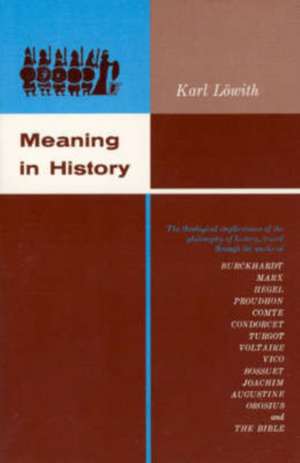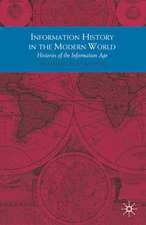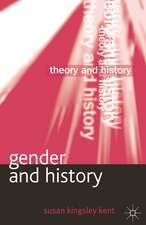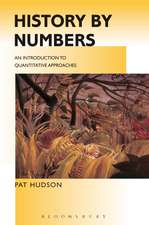Meaning in History: The Theological Implications of the Philosophy of History
Autor Karl Löwithen Limba Engleză Paperback – 15 apr 1957
Modern man sees with one eye of faith and one eye of reason. Consequently, his view of history is confused. For centuries, the history of the Western world has been viewed from the Christian or classical standpoint—from a deep faith in the Kingdom of God or a belief in recurrent and eternal life-cycles. The modern mind, however, is neither Christian nor pagan—and its interpretations of history are Christian in derivation and anti-Christian in result. To develop this theory, Karl Löwith—beginning with the more accessible philosophies of history in the nineteenth and eighteenth centuries and working back to the Bible—analyzes the writings of outstanding historians both in antiquity and in Christian times. "A book of distinction and great importance. . . . The author is a master of philosophical interpretation, and each of his terse and substantial chapters has the balance of a work of art."—Helmut Kuhn, Journal of Philosophy
Preț: 206.48 lei
Nou
Puncte Express: 310
Preț estimativ în valută:
39.52€ • 40.82$ • 32.89£
39.52€ • 40.82$ • 32.89£
Carte disponibilă
Livrare economică 04-18 martie
Livrare express 15-21 februarie pentru 20.99 lei
Preluare comenzi: 021 569.72.76
Specificații
ISBN-13: 9780226495552
ISBN-10: 0226495558
Pagini: 266
Ilustrații: black & white illustrations
Dimensiuni: 132 x 201 x 15 mm
Greutate: 0.29 kg
Editura: University of Chicago Press
Colecția University of Chicago Press
ISBN-10: 0226495558
Pagini: 266
Ilustrații: black & white illustrations
Dimensiuni: 132 x 201 x 15 mm
Greutate: 0.29 kg
Editura: University of Chicago Press
Colecția University of Chicago Press
Notă biografică
Karl Löwith (1897-1973) was professor of philosophy at Heidelberg University, Germany.
Cuprins
Introduction
I. Burckhardt
II. Marx
III. Hegel
IV. Progress versus Providence
1. Proudhon
2. Conte
3. Condorcet and Turgot
V. Voltaire
VI. Vico
VII. Boussuet
VIII. Joachim
IX. Augustine
X. Orosius
XI. The Biblical View of History
Conclusion
Epilogue
Appendix
I. Modern Transfigurations of Joachism
II. Nietzsche's Revival of the Doctrine of Eternal Recurrence
Acknowledgments
Notes
Index
I. Burckhardt
II. Marx
III. Hegel
IV. Progress versus Providence
1. Proudhon
2. Conte
3. Condorcet and Turgot
V. Voltaire
VI. Vico
VII. Boussuet
VIII. Joachim
IX. Augustine
X. Orosius
XI. The Biblical View of History
Conclusion
Epilogue
Appendix
I. Modern Transfigurations of Joachism
II. Nietzsche's Revival of the Doctrine of Eternal Recurrence
Acknowledgments
Notes
Index













